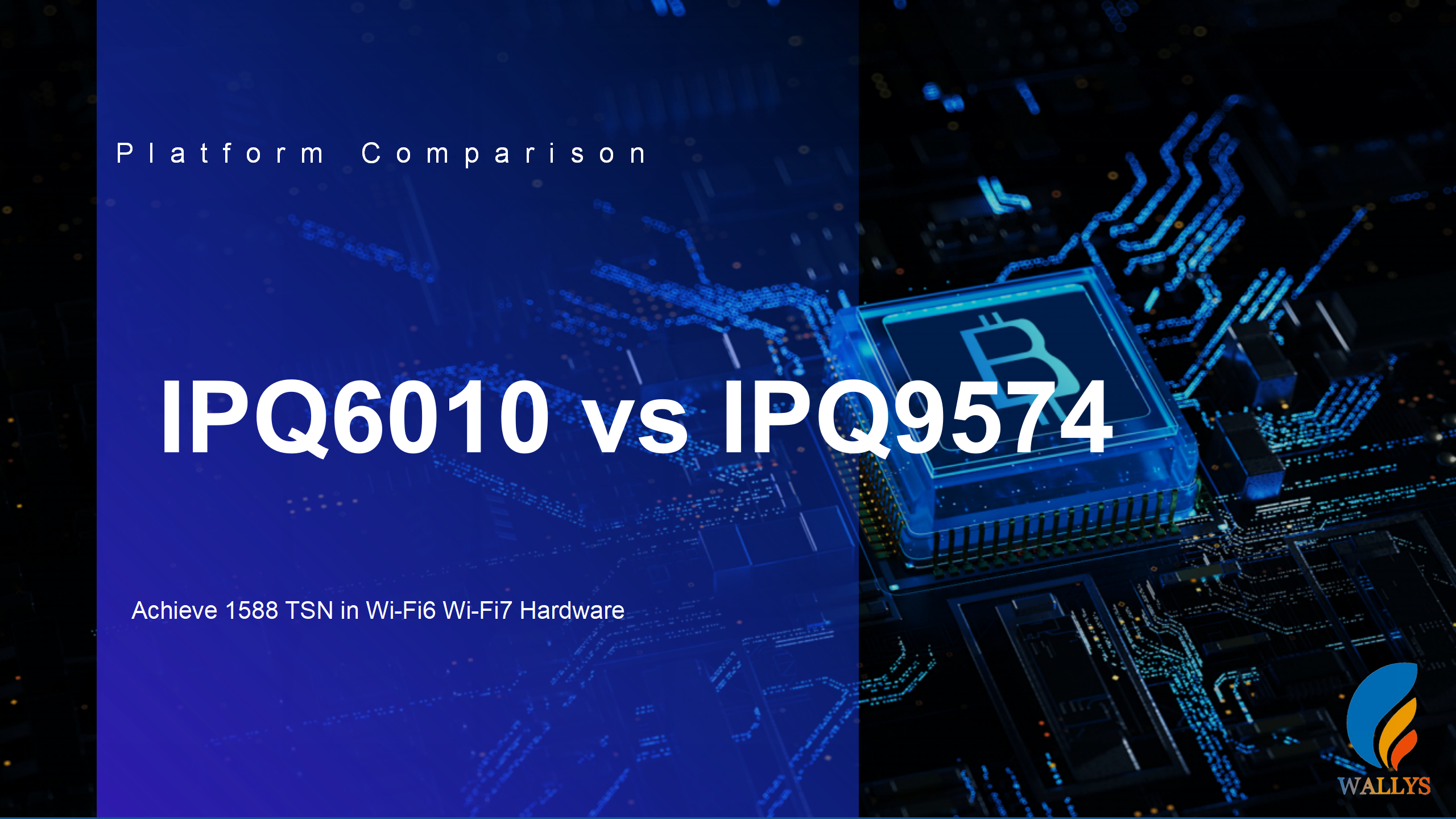IPQ6010 vs IPQ9574 Platform Comparison|Achieve 1588 TSN in WiFi6 WiFi7Hardware

IPQ6010 vs IPQ9574 Platform Comparison|Achieve 1588 TSN in WiFi6 WiFi7Hardware
In the realm of synchronization standards for wired networks, two prominent technologies, IEEE 1588 (802.1AS) and Time-Sensitive Networks (TSN), play pivotal roles. This article delves into the characteristics of each and explores ongoing efforts to integrate these features into cutting-edge WiFi hardware, namely the DR6018 (#IPQ6010) for WiFi 6 and DR9574 (#IPQ9574) for WiFi 7.
IEEE 1588 Soft Synchronization: IEEE 1588-2008, often referred to as IEEE 1588v2, offers a synchronization method tailored for wired networks. Its core functionality lies in enabling clock sharing among devices by selecting a grandmaster device, which disseminates timing packets to synchronize system clocks across the network. This soft synchronization ensures timing within 1 millisecond, although with some latency introduced during packet transmission and processing. Noteworthy is its robustness- in the absence of a grandmaster, an election process ensures the selection of a new grandmaster, ensuring continuous operation.
Time-Sensitive Networks (TSN): TSN, an evolution of Ethernet standards, builds upon the IEEE 1588 hardware synchronization profile. Unlike 1588, TSN generates an error if synchronization deviates from expected bounds, emphasizing precision. TSN's timing packets are also unique, featuring priority scheduling to ensure tight synchronization regardless of network traffic. It's important to note that TSN and 1588 networks are not interoperable, necessitating bridging with compliant hardware. TSN requires switches compliant with 802.1AS for enabling priority packet scheduling.
Integration Efforts in DR6018 (IPQ6010) and DR9574 (IPQ9574): Responding to client demands, our engineers are actively researching the integration of IEEE 1588v2 and TSN features into our DR6018 (WiFi 6) and DR9574 (WiFi 7) target hardware. These endeavors aim to enhance synchronization capabilities, providing clients with state-of-the-art WiFi solutions that meet the demands of modern networking requirements.
As technology continues to advance, the convergence of IEEE 1588 and TSN in WiFi hardware represents a significant step forward in meeting the stringent synchronization demands of today's networks. The ongoing research and development in our DR6018 and DR9574 hardware underscore our commitment to pushing the boundaries and creating value for our clients. No project is too small, and no challenge is too big- Wallys teams are here to provide customized solutions from concept to mass production. Let's collaborate to shape the future of WiFi technology.
Wallys Hardware:
DR6018
The Qualcomm-Atheros IPQ6010, a quad-core ARM 64-bit A53 processor clocked at 1.8GHz, delivers robust performance for a myriad of applications, enabling you to seamlessly run multiple virtual machines simultaneously without any lag or latency concerns. With 1GB of DDR3L system memory, the routerboard offers ample memory for your desktop applications. Furthermore, it features 32MB NOR flash and 256MB NAND flash, providing storage capacity for large datasets that might otherwise consume excessive hard drive or RAM space.
Notably, the DR6018 routerboard supports Dynamic Frequency Selection (DFS), allowing you to dynamically adjust the CPU frequency based on the workload of each virtual machine. This capability optimizes power consumption while upholding high-performance levels across all virtual machines, ensuring peak system efficiency, regardless of the number of tasks concurrently running on any given machine.
DR9574
At the heart of DR9574 lies the formidable IPQ9574 chipset by Qualcomm. This high-performance and robust chipset act as the backbone of the routerboard, enabling it to handle heavy data traffic and deliver seamless internet connectivity. With its DDR4 2GB RAM and 32MB Nor flash, supplemented by 256MB Nand Flash, the IPQ9574 ensures rapid data processing and storage capabilities.
At the heart of DR9574 lies the formidable IPQ9574 chipset by Qualcomm. This high-performance and robust chipset act as the backbone of the routerboard, enabling it to handle heavy data traffic and deliver seamless internet connectivity. With its DDR4 2GB RAM and 32MB Nor flash, supplemented by 256MB Nand Flash, the IPQ9574 ensures rapid data processing and storage capabilities.
At the heart of DR9574 lies the formidable IPQ9574 chipset by Qualcomm. This high-performance and robust chipset act as the backbone of the routerboard, enabling it to handle heavy data traffic and deliver seamless internet connectivity. With its DDR4 2GB RAM and 32MB Nor flash, supplemented by 256MB Nand Flash, the IPQ9574 ensures rapid data processing and storage capabilities.
DR9574 is designed to thrive even in the most challenging environments. With a robust power input of 12VDC, it exhibits remarkable stability and reliability. For users seeking Power over Ethernet (POE), Wallys offers customization options to meet specific needs.











评论